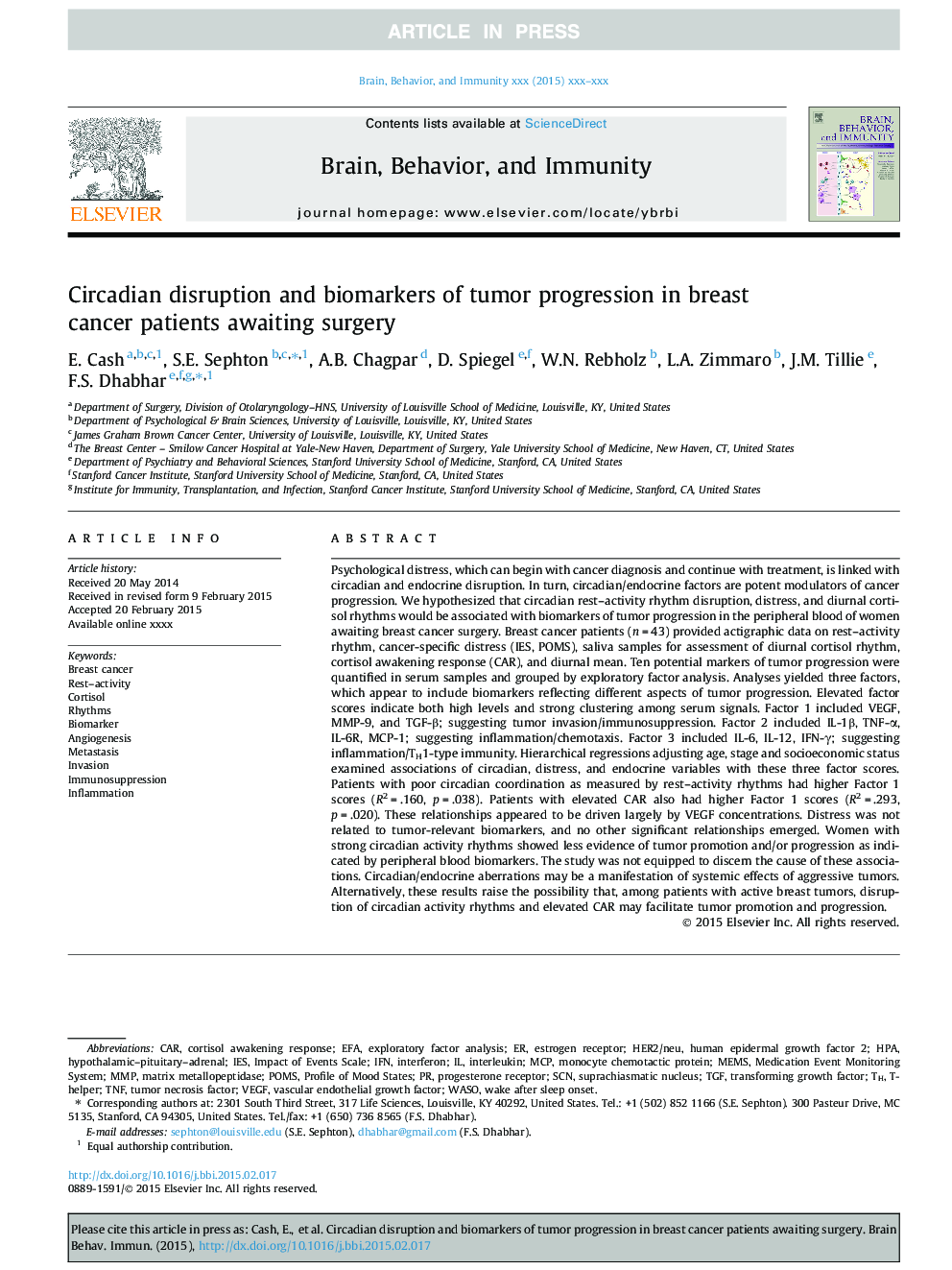| کد مقاله | کد نشریه | سال انتشار | مقاله انگلیسی | نسخه تمام متن |
|---|---|---|---|---|
| 7280934 | 1473919 | 2015 | 13 صفحه PDF | دانلود رایگان |
عنوان انگلیسی مقاله ISI
Circadian disruption and biomarkers of tumor progression in breast cancer patients awaiting surgery
ترجمه فارسی عنوان
اختلال در دوران بارداری و بیومارکرهای پیشرفت تومور در بیماران مبتلا به سرطان پستان در انتظار جراحی
دانلود مقاله + سفارش ترجمه
دانلود مقاله ISI انگلیسی
رایگان برای ایرانیان
کلمات کلیدی
IESTNFEFAT-helperMMPSCNMCPTGFMEMS - فناوری میکرو الکترومکانیکیPOMs - POM هاAngiogenesis - آنژیوژنزinflammation - التهاب( توروم) interferon - اینترفرونIFN - اینترفرون هاinterleukin - اینترلوکینHER2/neu - با HER2 / neuWake after sleep onset - بیدار شدن بعد از خوابBiomarker - بیومارکرtransforming growth factor - تبدیل فاکتور رشدExploratory Factor Analysis - تجزیه و تحلیل فاکتور اکتشافیInvasion - تهاجمRhythms - ریتم هاBreast cancer - سرطان پستانImmunosuppression - سرکوب سیستم ایمنیMedication event monitoring system - سیستم نظارت بر داروHuman epidermal growth factor 2 - عامل رشد اپیدرمی انسان 2Vascular endothelial growth factor - فاکتور رشد اندوتلیال عروقیVascular Endothelial Growth Factor (VEGF) - فاکتور رشد اندوتلیال عروقی (VEGF)tumor necrosis factor - فاکتور نکروز تومورmatrix metallopeptidase - ماتریکس متالوپپتیدازCAR - ماشینMetastasis - متاستاز Profile of Mood States - مشخصات Mood StatesHPA - میلی بار یا هکتوپاسکالSuprachiasmatic nucleus - هستههای سوپراکیاسماتیکhypothalamic–pituitary–adrenal - هیپوتالاموس-هیپوفیز-آدرنالWASO - واسهCortisol awakening response - پاسخ بیداری کورتیزولmonocyte chemotactic protein - پروتئین chemotactic monocytecortisol - کورتیزولEstrogen receptor - گیرنده استروژنProgesterone receptor - گیرنده پروژسترون
موضوعات مرتبط
علوم زیستی و بیوفناوری
ایمنی شناسی و میکروب شناسی
ایمونولوژی
چکیده انگلیسی
Psychological distress, which can begin with cancer diagnosis and continue with treatment, is linked with circadian and endocrine disruption. In turn, circadian/endocrine factors are potent modulators of cancer progression. We hypothesized that circadian rest-activity rhythm disruption, distress, and diurnal cortisol rhythms would be associated with biomarkers of tumor progression in the peripheral blood of women awaiting breast cancer surgery. Breast cancer patients (n = 43) provided actigraphic data on rest-activity rhythm, cancer-specific distress (IES, POMS), saliva samples for assessment of diurnal cortisol rhythm, cortisol awakening response (CAR), and diurnal mean. Ten potential markers of tumor progression were quantified in serum samples and grouped by exploratory factor analysis. Analyses yielded three factors, which appear to include biomarkers reflecting different aspects of tumor progression. Elevated factor scores indicate both high levels and strong clustering among serum signals. Factor 1 included VEGF, MMP-9, and TGF-β; suggesting tumor invasion/immunosuppression. Factor 2 included IL-1β, TNF-α, IL-6R, MCP-1; suggesting inflammation/chemotaxis. Factor 3 included IL-6, IL-12, IFN-γ; suggesting inflammation/TH1-type immunity. Hierarchical regressions adjusting age, stage and socioeconomic status examined associations of circadian, distress, and endocrine variables with these three factor scores. Patients with poor circadian coordination as measured by rest-activity rhythms had higher Factor 1 scores (R2 = .160, p = .038). Patients with elevated CAR also had higher Factor 1 scores (R2 = .293, p = .020). These relationships appeared to be driven largely by VEGF concentrations. Distress was not related to tumor-relevant biomarkers, and no other significant relationships emerged. Women with strong circadian activity rhythms showed less evidence of tumor promotion and/or progression as indicated by peripheral blood biomarkers. The study was not equipped to discern the cause of these associations. Circadian/endocrine aberrations may be a manifestation of systemic effects of aggressive tumors. Alternatively, these results raise the possibility that, among patients with active breast tumors, disruption of circadian activity rhythms and elevated CAR may facilitate tumor promotion and progression.
ناشر
Database: Elsevier - ScienceDirect (ساینس دایرکت)
Journal: Brain, Behavior, and Immunity - Volume 48, August 2015, Pages 102-114
Journal: Brain, Behavior, and Immunity - Volume 48, August 2015, Pages 102-114
نویسندگان
E. Cash, S.E. Sephton, A.B. Chagpar, D. Spiegel, W.N. Rebholz, L.A. Zimmaro, J.M. Tillie, F.S. Dhabhar,
